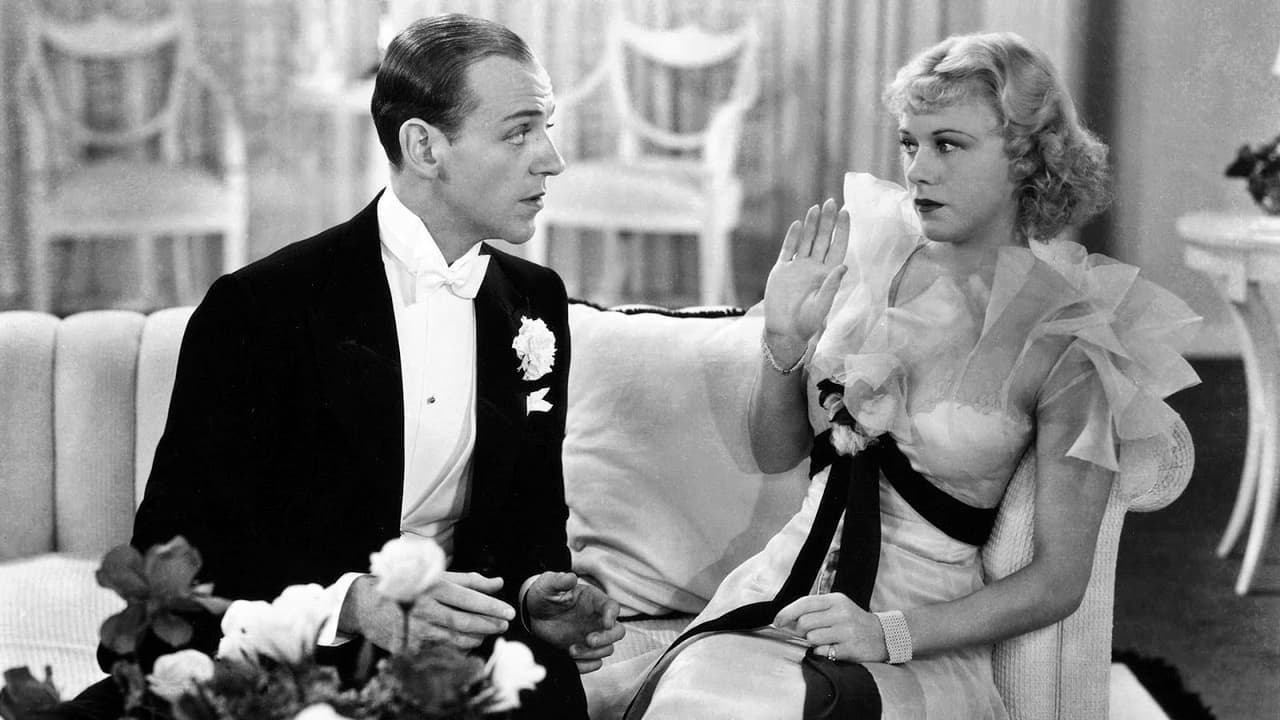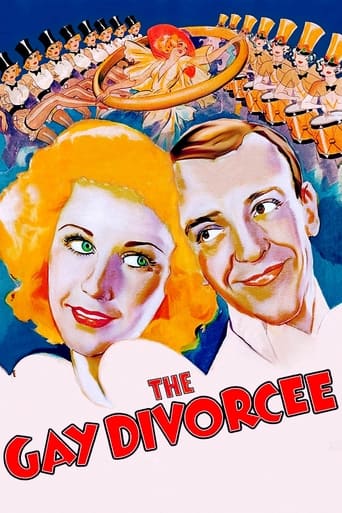KnotStronger
This is a must-see and one of the best documentaries - and films - of this year.
Billie Morin
This movie feels like it was made purely to piss off people who want good shows
Yazmin
Close shines in drama with strong language, adult themes.
Allissa
.Like the great film, it's made with a great deal of visible affection both in front of and behind the camera.
SamPamBam
There are movies that are meant to make you think, and movies meant to shock and keep you in suspense.
Forget that.
This is pure entertainment.
Wonderfully cast, beautiful sets and art direction...and then, the dance.
The magnificent Night and Day is meant to be absorbed and cherished as that one moment when everything was perfect.
Just enjoy. Nothing recent comes close.
juliastarkap
The Gay Divorcee, is technically Fred Astaire and Ginger Roger's second film (if you count Flying Down to Rio) and it's a fun little romantic comedy musical. It follows Ginger Rogers who travels to England to get a divorce from her husband, and meets Fred Astaire. Ginger's lawyer suggests that she be spotted with another man in order to get her husband to divorce her, and she mistakes Fred Astaire as the man who she is to be spotted with. The truth comes out, and they dance together. Of course, everything works out in the end.The plot is a bit stronger than Flying Down to Rio, and I liked the characters a lot more. You can really sympathize with Ginger Rogers as she feels ignored by her husband and is desperate for a divorce. Fred Astaire is a suave professional dancer, and falls in love with Ginger. The humor in this movie works. I think the scenes with Ginger's lawyer and her aunt are funny, and Erik Rhodes, the man who Ginger is to be spotted with is hilarious. Some of Fred Astaire's lines are funny.This is a classic movie musical, and it has the usual tropes. Near instant romance, miscommunication that could be solved with a two minute conversation, and elaborate dance numbers. Of course, the dance numbers were excellent. "The Continental" is a fun, beautiful dance sequence. Betty Grable's "Knock Knees" number is entertaining. "Night and Day" is a beautiful sequence with a beautiful dance by Fred and Ginger. And that's really why you watch these movies. Not for the practically non-existent plot, but the dance scenes.Overall, The Gay Divorcee is nowhere near the best musical ever made. It's not even the best Astaire/Rogers film. But it's still a fun, enjoyable, happy movie to watch.
cricket crockett
" . . . if you can blend the two," Aunt Hortense advises her niece Mimi (Ginger Rogers). Why not be an instant winner of Dancing with the Stars, too? The premise of THE GAY DIV0RCEE is that pro hoofer Guy Holden (Fred Astaire) falls in love with a geologist's estranged\neglected\divorce-minded wife (Mimi). Furthermore, whenever he smiles at her, she can instantly dance backwards upstairs and across furniture by the unexplained magic of his proximity. She's rich enough to drive something that looks like a Dusenberg, and it just takes a few sappy love songs (such as Cole Porter's "Night and Day") to make Mimi fall for Guy's charms. "Best original song" always has been the strangest Oscar Award category, and the first winner from THE GAY DIV0RCEE sets the pattern. This 16-minute, 50-second (!) song--"The Continental"--features a patio full of random night club dancers getting sprinkled with Astaire's fairy dust and suddenly appearing in coordinated show costumes, dancing in formation like something from the mind of that old drill sergeant, Busby Berkeley!
chaos-rampant
Well, Fred and Ginger were really beautiful together. Try to imagine this: clean, very clean environments with some evocative—artificial— horizons, here a seaside resort, lovers who are destined but fate dredges up all sorts of dreamlike illusion to keep apart, a plot that emphasizes both fate and multilayered worry about hidden selves, the illusion (the worry) conquered with persistent love and expressed with dance.And yet, what a striking thing that it doesn't work like noir, where fate and hidden selves play a similar function; the difference is that the viewer has too much control over the players and plot.Is this why it registers like magic? We trust that all is going to turn out well.. Like Fred's character, we persist with the story because we feel safe and happy that it will all turn up for the better.From this pov, mishap thrown up by the gods is not as in noir the cause of anxious hallucination, but small, glittering bubbles of fate. Of course it is all so sunny, because the protagonist is, and is unafraid to take chances—this infectious radiance colors the world.Top Hat is much more intricate, because you have two characters doubled with several more layers, here just one. This is easier to digest, more fun.

